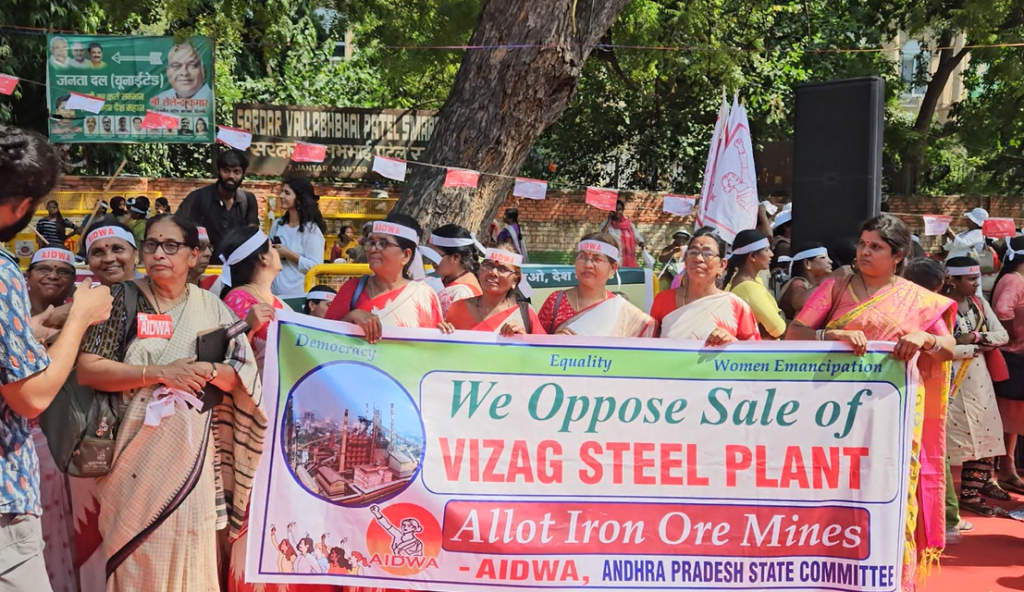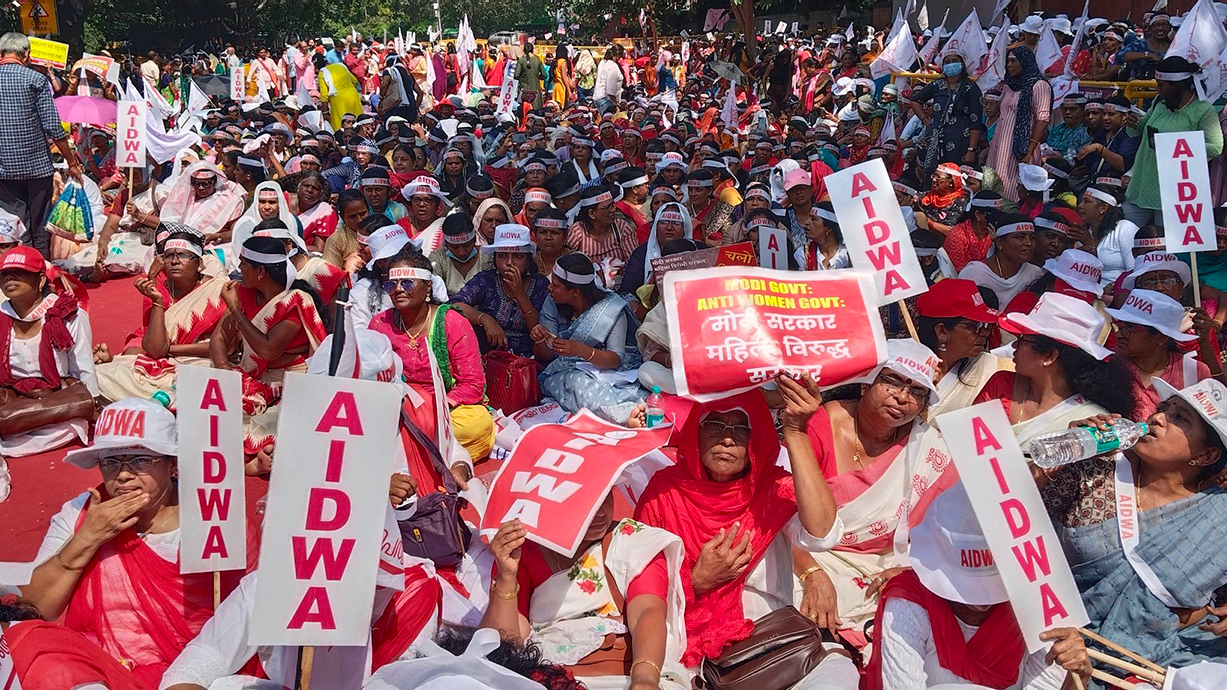Thousands of women from across India gathered in the capital of Delhi on October 5 to protest worsening socio-economic conditions under the government of Prime Minister Narendra Modi.
Organized by the All India Democratic Women’s Association (AIDWA), the largest women’s organization in the country, the action was held under the banner, “BJP-RSS [Modi’s Bharatiya Janata Party and its far-right ideological parent organization, the Rashtriya Swayamsevak Sangh] Hatao, Mahila Bachao, Desh Bachao!” or, “Remove BJP-RSS, Save women, Save the country.”
The protest brought together 10,000 women from over 25 states across India. According to AIDWA President Mariam Dhawale, “The women have declared, we will unite together and defeat the Modi government and BJP-RSS in 2024 [the year India will hold its next general elections].”
Speaking to the plight of women in the country today, Dhawale told Newsclick, “the BJP-RSS government is intent on destroying the country… to destroy the country is to destroy the impoverished people living in the country… hunger has risen, unemployment has risen, violence has risen… the government is selling to Ambani and Adani.”
Mukesh Ambani and Gautam Adani are billionaire Indian businessmen who have held close ties with Narendra Modi and have benefitted immensely from the current administration’s pro-corporate, neoliberal policies.
Meanwhile, Dhawale added, “a whole conspiracy has been devised to divide people on the basis of religion using the politics of hatred, the people are very distressed by this… To ensure that people remain afraid, that they do not come together, a politics of suppression is being used.”
Ahead of Thursday’s march, AIDWA had also raised serious concerns regarding other recent policy moves by the central government, including its decision to exclude anemia as a survey indicator in the National Family Health Survey- 6 (NFHS-6) which will be conducted between 2023-24.
The results of the previous NFHS survey had found that over 57% of women in the country, and over 67% of children, were suffering from the condition.
On September 28, members of AIDWA in Puducherry also carried out a protest march against the central government’s decision to shut down subsidized food ration shops under the Public Distribution System (PDS) in the Union Territory (UT) for the past four years.
📣💪 Our ration, our right!
#AIDWA Puducherry rallied for justice, demanding the reopening of ration shops. NDA ruling Govt closed ration shops.
🍲 Let's stand together and appeal to the NR BJP govt to ensure access to essential food supplies for all. #RationShops #Food pic.twitter.com/QZuVWDNLmy— CPI(M) Puducherry ☭ (@pycpim) September 28, 2023
The decision to close down PDS shops and replace them with direct cash transfers for impoverished families was implemented by the territory’s then governor, and BJP leader, Kiran Bedi, despite opposition from Puducherry’s elected government (governors hold substantial discretionary powers over UTs in the country). The cash transfer system has been marred by stalled payments, prompting repeated protests, including by the Communist Party of India (Marxist).
“If our daughters indeed need to be saved, it is from the RSS… from the BJP”
While “Beti Bachao, Beti Padhao” (Save daughters, Educate daughters) has been a much touted policy of the Modi government, Thursday’s protest march drew attention to the reality of the treatment of women at the hands of the state.
Asha Sharma, the secretary of AIDWA in Delhi, drew attention to the case of Bilkis Bano, a Muslim woman who was brutally raped and her family massacred during the anti-Muslim pogrom in Gujarat in 2002, when Modi was the state’s chief minister. The 11 men who were convicted of her rape were freed in 2022 by a committee established by the state government.
Sharma further brought to the fore other incidents of horrific sexual violence in India in recent years, including the gruesome 2020 rape and death of a 19-year-old girl from the Valmiki community (which is among the most historically oppressed Dalit castes) by four oppressor caste men in Hathras in Uttar Pradesh.
The response of the BJP-led state administration drew heavy condemnation, especially their initial denial that rape ever even took place and the subsequent forcible cremation of the victim’s body by police in the middle of the night, without her family’s consent.
Siddique Kappan, a journalist who was on his way to report on the case, was arrested and charged under India’s draconian anti-terror law, the Unlawful Activities Prevention Act (UAPA). After spending two years in detention without trial, Kappan was granted bail earlier this year.
In 2017, a 17-year-old girl was gang-raped in UP’s Unnao. In 2019, while on her way to testify against her attackers, the survivor was set ablaze and killed. A few days later, expelled BJP lawmaker, Kuldeep Singh Sengar, was convicted and sentenced to life imprisonment for her murder. He was subsequently also sentenced to 10 years in prison for the death of the victim’s father in police custody.
“If our daughters indeed need to be saved, it is from the RSS… from the BJP,” Sharma said, referencing how the Hathras rape accused had actually been lauded by BJP leaders.
The long-delayed response to the allegations of sexual misconduct brought against the now former head of the Wrestling Federation of India and BJP MP, Brij Bhusan Sharan Singh, by female athletes also drew widespread condemnation. A police report has also been filed against the now former sports minister of Haryana and BJP leader Sandeep Singh in a sexual harassment complaint filed by a junior female coach.
At present, Singh is Haryana’s Minister of State for Printing and Stationery in Haryana.
Also read: Demanding gender justice from a government steeped in patriarchy
Women refuse to be placated
“The policies adopted by the BJP government are anti-women,” said AIDWA Vice President Jagmati Sangwan.
She highlighted the recent Women Reservation Bill 2023 that was approved by the lower house of the Indian Parliament, or Lok Sabha. However, it could be long until the legislation, which would reserve 33% of the seats in the Lok Sabha and state legislative assemblies for women, actually comes into force.
The Bill carries an added caveat which determines that it can only come into force after Lok Sabha constituencies have been delimited. This, in turn, can only take place after the completion of the population census which has been pending since 2021.
“It is merely a piece of paper,” Sangwan said, adding that many other existing laws to protect women, including those related to dowry, had been defanged and undermined.
She warned that the BJP was now trying to clean up its anti-women image. However, she declared that AIDWA would continue mobilizing and informing women of the true implications of the reservation bill.
Thursday’s protest provided a platform for women to vocalize a broad range of demands. Rampari, a member of AIDWA from the state of Bihar, called for the provision of foodgrains at subsidized rates, for an end to rising prices, and for the creation of employment, and importantly, also raised the issue of land.
She stressed that AIDWA would continue mobilizing women as the general elections draw near, “Our slogan is BJP-RSS Hatao and with this slogan we will campaign to remove the anti-women, anti-poor, anti-youth, anti-nation, and dictatorial government that is attacking democracy from the seat of Delhi.”
Women also spoke out against the issue of privatization, especially the reported attempts of the central government to sell the Visakhapatnam Steel Plant (VSP) in Andhra Pradesh to the Adani Group and South Korean steel company, POSCO. Plans to privatize the steel plant are not recent, and have been met with steadfast resistance from trade unions and communities for decades.

While the BJP has since stated that plans to privatize the site have been put on hold, “the sword is still hanging [over the heads of the people],” said a member of AIDWA’s Andhra Pradesh State Committee.
“The employees of the steel plant, their families, the populations of Andhra Pradesh and Telangana are fighting against privatization,” she stated, adding that the plant, which has been classified as a “Navratna” public sector enterprise with considerable financial autonomy, was a matter of national heritage. “National wealth belongs to the nation… we have to protect it.”





